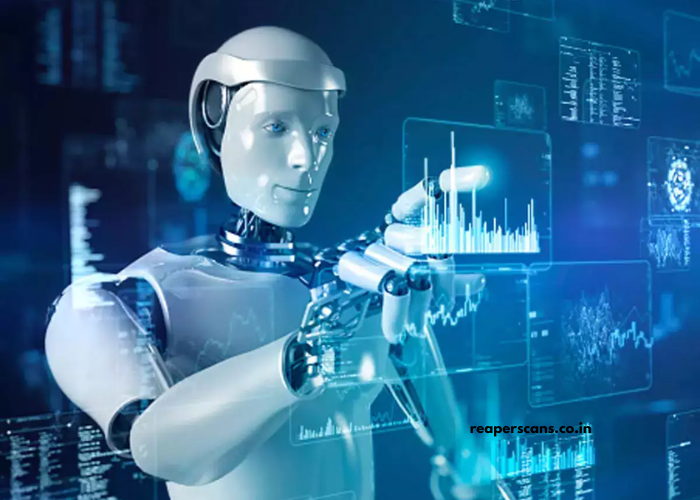Artificial Intelligence (AI) has rapidly evolved over the past few decades, marking itself as a key player in shaping the future of technology. In 2025, AI is no longer a distant futuristic concept but a present-day reality that is drastically transforming industries, enhancing daily life, and revolutionizing the way we approach business, healthcare, education, and more. This article delves into how AI is influencing technology in 2025 and its vast implications across various sectors.
The Evolution of AI: From Theory to Practice
AI’s journey from theoretical foundations to real-world applications has been nothing short of transformative. Early concepts of AI revolved around mimicking human intelligence in machines, focusing on symbolic reasoning and logic. Fast forward to 2025, and AI is now deeply integrated into our daily lives, making machines smarter and more capable of performing tasks autonomously.
In 2025, AI technologies such as machine learning (ML), natural language processing (NLP), robotics, and computer vision have matured. The widespread deployment of these technologies has not only enhanced automation but also fostered innovations in problem-solving, decision-making, and predictive analytics.
Machine Learning and Deep Learning in 2025
One of the most significant contributions of AI to technology in 2025 is through machine learning and deep learning algorithms. These techniques allow computers to learn from data and improve performance without explicit programming. By training on massive datasets, AI systems can identify patterns, make predictions, and optimize solutions across industries.
Machine learning models have become significantly more accurate and efficient by 2025, enabling smarter automation, personalized recommendations, and enhanced data-driven decision-making. For instance, self-driving cars, powered by deep learning, are increasingly capable of navigating complex environments with minimal human intervention. In healthcare, AI models analyze patient data to predict disease progression and suggest treatment options, helping doctors provide more accurate diagnoses and better patient outcomes.
The Role of AI in Transforming Industries
1. Healthcare
AI’s impact on healthcare has been profound in 2025, revolutionizing the way medical professionals diagnose, treat, and monitor patients. Machine learning algorithms, for example, have become essential tools in detecting medical conditions early on, such as cancers, neurological disorders, and cardiovascular diseases. AI systems analyze medical images, such as X-rays and MRIs, with a level of precision that exceeds human doctors in some cases.
Additionally, AI-powered virtual health assistants have made it easier for patients to access medical advice and schedule appointments. These digital assistants are capable of answering medical queries, offering health tips, and guiding patients through their healthcare journeys.
In drug development, AI is accelerating the process by simulating molecular interactions and predicting how new compounds will behave, reducing the time it takes to bring life-saving medications to market.
2. Automotive
AI has brought groundbreaking advancements to the automotive industry, particularly in the realm of autonomous vehicles. By 2025, self-driving cars are no longer a futuristic dream but an emerging reality on the roads. AI technologies, including computer vision and reinforcement learning, enable vehicles to navigate roads, recognize obstacles, and make real-time decisions in unpredictable environments.
These advancements have not only improved road safety but also promised to reduce traffic congestion, lower fuel consumption, and minimize carbon emissions. Moreover, AI is playing a key role in enhancing in-vehicle experiences by personalizing entertainment systems, providing voice-activated controls, and integrating predictive maintenance to ensure vehicle performance is optimal.
3. Manufacturing and Automation
The manufacturing sector is one of the biggest beneficiaries of AI-driven automation. In 2025, intelligent robots equipped with machine learning algorithms are not only performing repetitive tasks but also optimizing production lines in real-time. These robots can predict equipment failures, monitor product quality, and adjust production schedules autonomously.
AI has also transformed supply chain management, allowing manufacturers to anticipate demand shifts, manage inventory, and improve logistics. Predictive analytics powered by AI ensures that businesses maintain the right stock levels, avoid delays, and streamline their operations.
4. Finance and Banking
AI’s impact on finance and banking in 2025 is revolutionary. Machine learning algorithms now power high-frequency trading systems, where they can process vast amounts of market data and execute trades at speeds and efficiencies far beyond human capabilities. AI-driven fraud detection systems are also more advanced, analyzing transaction data in real-time to flag suspicious activities and prevent financial crimes.
Moreover, AI is transforming customer service in the banking sector. Chatbots and virtual assistants are handling customer queries, processing transactions, and even providing financial advice. These AI-driven systems not only reduce operational costs but also enhance the overall customer experience by offering 24/7 support.
5. Retail and E-Commerce
AI in retail and e-commerce has radically transformed the way businesses interact with customers. By 2025, AI is powering personalized shopping experiences that cater to individual preferences. Retailers use AI to analyze customer behavior, predict trends, and offer tailored recommendations, boosting sales and customer satisfaction.
AI chatbots and virtual assistants are also becoming commonplace in customer service, answering questions, helping with product searches, and processing orders. Additionally, AI is optimizing inventory management, allowing retailers to predict demand and ensure that shelves are stocked with the right products at the right time.
6. Education
Education is another sector undergoing rapid transformation due to AI. In 2025, AI-powered tools are revolutionizing the way students learn and teachers educate. Personalized learning platforms, for example, adapt content to suit each student’s learning style, pace, and preferences. These platforms provide real-time feedback, track student progress, and even offer additional resources for struggling students.
AI-driven chatbots and virtual tutors are also becoming more advanced, capable of answering academic questions, providing explanations, and offering guided learning experiences.
Ethical Considerations and Challenges of AI in 2025
While AI offers countless benefits, its rapid growth raises several ethical considerations and challenges that must be addressed in 2025 and beyond.
1. Job Displacement
AI-driven automation has undoubtedly led to increased efficiency and productivity, but it has also sparked concerns about job displacement. In sectors such as manufacturing, transportation, and customer service, many tasks previously performed by humans are now being done by machines. By 2025, millions of jobs are expected to be automated, leading to the need for retraining and upskilling workers.
It is essential for governments, businesses, and educational institutions to collaborate in providing workers with the skills necessary to thrive in an AI-driven world. Investment in reskilling programs and the development of new job roles will be crucial in ensuring a smooth transition into this new era.
2. Bias and Fairness
AI algorithms are only as good as the data they are trained on. If the data used to train AI models is biased, the resulting systems may make unfair or discriminatory decisions. This has raised concerns in areas such as hiring, lending, and law enforcement, where AI tools could unintentionally perpetuate existing biases.
In 2025, addressing bias in AI remains a top priority. Developers are focusing on creating transparent and accountable AI systems, implementing fairness checks, and using diverse datasets to reduce the risk of biased outcomes.
3. Privacy and Security
As AI systems collect and analyze vast amounts of personal data, concerns about privacy and data security are at an all-time high. By 2025, AI-powered surveillance systems, facial recognition, and data-driven marketing strategies are commonplace, which means that the potential for misuse and breaches of privacy is significant.
Regulatory frameworks, such as the General Data Protection Regulation (GDPR) in the European Union, will need to evolve to address these new challenges. Ensuring that AI systems are secure, transparent, and respectful of individuals’ privacy rights will be critical in maintaining public trust.
The Future of AI in 2025 and Beyond
As AI continues to evolve, we can expect further advancements that will continue to transform technology and the world at large. Some of the key trends that will shape the future of AI in 2025 and beyond include:
1. Autonomous Systems
AI-powered autonomous systems are expected to make significant strides in industries such as transportation, logistics, and healthcare. Self-driving vehicles, drones, and robots will become even more capable, reliable, and integrated into everyday life.
2. General AI and Superintelligence
While current AI systems are designed for specific tasks, the development of Artificial General Intelligence (AGI) and eventually superintelligent machines could mark a new era of technology. These systems would be capable of performing any cognitive task that humans can, potentially revolutionizing fields such as problem-solving, creativity, and scientific discovery.
3. AI in Creativity
AI’s ability to generate art, music, literature, and even design is already being explored in 2025. As AI becomes more adept at creative tasks, it could revolutionize industries such as entertainment, advertising, and media.
4. AI-Driven Sustainability
AI will also play a crucial role in addressing global challenges such as climate change and resource depletion. By 2025, AI-powered systems will help optimize energy usage, reduce waste, and monitor environmental conditions, driving a more sustainable future.
Conclusion
Artificial Intelligence is fundamentally changing the landscape of technology in 2025. Its influence spans multiple industries, from healthcare and automotive to finance, retail, and education. As AI continues to evolve, it will shape the future of technology, creating new opportunities and challenges. While there are ethical and practical hurdles to overcome, the potential for AI to enhance human capabilities and improve the quality of life is enormous. The AI revolution in 2025 is only the beginning, and the possibilities are limitless.





